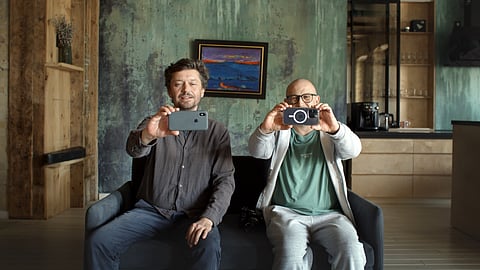

It goes without saying that given the reality of the ongoing Russo-Ukrainian War, Valentyn Vasyanovych’s To The Victory is acutely relevant to our times. But, at first glance, what catches the eye about the film is the ingenuity of form. Vasyanovych invokes the proscenium, making the screen feel like the stage complete with the fourth wall. Each scene unfolds on a static set captured by a largely stationary camera, with the sense of movement and momentum induced by the actors (usually facing the camera and the audience) and their compelling conversations that, at times, feel like testimonials or confessionals.
Fittingly, the Ukraine-Lithuania co-production won the Platform Award at the recently concluded Toronto International Film Festival (TIFF) honouring its directorial vision and distinctive storytelling.
The inventiveness also stems from the way To The Victory adds its own unique meta dimension to the customary genre of films on filmmaking. Set in Ukraine of 2026, after the end of war (an optimistic thought at this juncture), it is about filmmaking in the times of individual, familial, social, political, economic as well as cinematic uncertainties and an all-round instability. Mixing the real with the fictional, Vasyanovych goes on a self-referential (not wholly autobiographical) mode. He plays actor-director Valyk trying to put together a film in Kyiv. While he couldn’t leave his parents behind to find a life away from Ukraine and lives there with his 18-year-old son (Hryhoriy Naumov) and ailing father (Volodymyr Kuznetsov), his wife (Marianna Novikova) and daughter, who immigrated during the war, have built things up from scratch in Vienna. Meanwhile, his close friend Vlad (Vladen Odudenko), has decided to move to Spain, give up on filmmaking and become a bartender there, all to reunite with his family: “My little girl is waiting for me.”
Vasyanovych calls his film a “collective biography of my circle of life”, drawing from lived experiences of himself and his friends. It's about how several families, which couldn’t bear the burden of such an enforced separation, broke apart. Vasyanovych saw it happening around him. Though his own family held together, it made him wonder what havoc time and distance might wreck on them in the time to come.
In the near future of To The Victory the war may have stopped but many battles are shown to be still raging on in a Ukraine that has turned into an almost all-male country. Vasyanovych’s dystopian vision zooms in on the threat of a larger demographic challenge with over 12 million Ukrainians living abroad with no plans of a return. Will the country then be reduced to a mere territory? He criticises his son for being constantly online with no sense of the real world, with the teenager asking him rhetorically: “But where is the real world?”
Shot frugally, with a small crew that also doubles up as actors (most of them for the first time), it underscores guerrilla filmmaking as obligatory, given the constraints and restraints in the nation itself. It also lends a touch of documentary-realism to the film. The minimalism has a way of adding to the understated but profound emotional tenor, like in the standout separation scene of the filmmaker and his wife that, ironically, cements and formalises the fact that there can be no happy end to their story: “We can’t overcome the conflict that destroys our lives.”
The rambling narrative mirrors the disorderliness in filmmaking in a country at war with itself. Despite the emotional crises, there are welcome bursts of humour as well like the filmmaker participating in a virtual meeting to procure grants for his film. By playing the lead role of the actor-director himself (as he also does in the film within the film), Vasyanovych brings an honesty and truth to his own deeply felt confusions and restlessness, as an individual and as a creator. His on screen avatar keeps hoping that things will stabilise and get better. But will they? Even though the title of the film is a toast to the future, as a filmmaker he leaves us with no clear answers nor any instant solutions for Ukraine, with or without Russia looming large on the horizon.